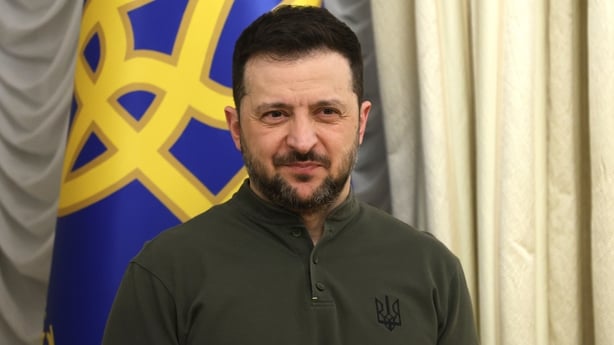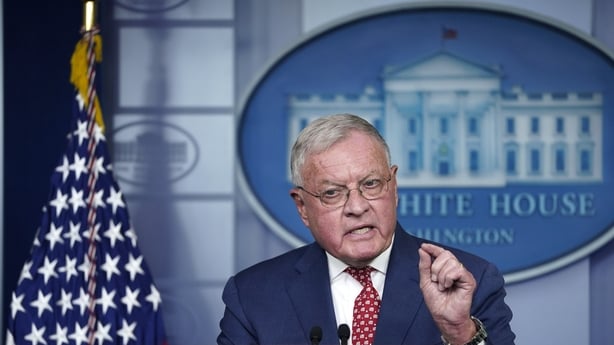The phone call between US President Donald Trump and Russian President Vladimir Putin was bound to happen at some stage.
But Mr Trump’s description of yesterday's conversation has confirmed the worst for Ukraine.
There is no sugar coating it.
The US leader’s phone call has reset the dial on US-Russia relations and Kyiv looks sidelined from the main conversation around how to end the war.
Gone is any whiff of the Biden administration’s condemnation of Russia’s illegal war of aggression.
Instead, Mr Trump’s words treated Mr Putin as a friend, someone he could do business with.
"I want to thank President Putin for his time and effort with respect to this call," wrote President Trump.
The two leaders also discussed visiting each other’s countries.
The sight of Mr Putin and Mr Trump strolling through the rose garden at the White House during the next four years doesn’t seem entirely unfathomable now.
The sequence of the US president’s phone calls yesterday also says a lot about how he and his administration intend to approach peace talks to end the war.
He contacted Mr Putin first, not Ukraine’s President Volodymyr Zelensky, a sign that the United States will be paying more attention to Russia’s hardline demands in exchange for stopping its invasion.
Mr Zelensky had to be informed by Mr Trump about the contents of the call.

Earlier yesterday, the US Secretary of Defense Pete Hegseth, speaking in Brussels, set out the new administration’s position on Ukraine.
He said the US wants a "sovereign and prosperous Ukraine" and that the country must be given security guarantees.
But that’s where the good news ended for Kyiv.
Mr Hegseth then delivered three seismic diktats: firstly, returning to Ukraine’s pre-2014 borders is unrealistic.
Secondly, Ukraine becoming a NATO member is also not realistic.
Thirdly, no American troops will be deployed as peacekeepers to Ukraine to maintain a post-war settlement.
Any future peacekeeping force, he said, would not be deployed as a NATO force and would not be guaranteed by Article 5 of the NATO Treaty - meaning an attack on one country is an attack on all alliance members.
Read more:
Unlikely Ukraine will get all land back, says Trump
Any Ukraine deal 'behind our backs' won't work - Kallas
Ukraine govt, people must be central to peace deal - McGrath
Latest Ukraine stories
The US is doing all of the talking but plans to do little of the heavy lifting after the guns fall silent.
With this statement, the White House made it clear that Europe will have to guarantee the post-war peace by putting their soldiers’ boots on the ground.
Patrolling a 1,300 km demilitarised frontline will be a massive task and require tens of thousands of troops at the very least.
President Trump is, however, interested in a deal to secure an estimated $500bn worth of Ukrainian minerals.
US Treasury Secretary Scott Bessent was in Kyiv yesterday to discuss an early draft of the potential deal with Mr Zelensky and how it would contribute exactly to guaranteeing Ukrainian security.
Mr Zelensky will meet US Vice President JD Vance tomorrow at the Munich Security Conference, an annual meeting of world leaders to discuss global defence matters.
There’s no doubt that the war in Ukraine will dominate this year’s event.
US Special Envoy for Ukraine and Russia Keith Kellogg will also attend and is expected to discuss details of the proposed US peace plan for Ukraine with European allies.

Yesterday’s developments will have pleased Mr Putin. Quite simply, Russia’s demands are being met.
Mr Hegseth’s statement mentioned two of them: no NATO membership for Ukraine and no return to Ukraine’s pre-2014 borders.
Mr Putin demands the full annexation of four eastern Ukrainian regions - Donetsk, Luhansk, Kherson and Zaporizhzhia - even though Russia does not occupy all of this territory.
That’s where Ukraine and Europe can still focus their energy and challenge Russia’s demand to control the entirety of the four regions as part of a post-war settlement.
Mr Kellogg is due to travel to Kyiv before the end of this month to further discuss steps towards peace.
Given the tone of yesterday’s Trump-Putin call and commitment to start negotiations "immediately", a visit by Mr Kellogg to Moscow after his talks in Kyiv cannot be ruled out.
So, in one fell swoop, Mr Trump has recalibrated US policy on the war in Ukraine.
Ukraine must accept the loss of almost one-fifth of its territory, for the time being at least, but stands to benefit from increased American investment and continued military support.
In Munich this weekend, European leaders will push for a central role in peace talks. So too will Ukraine, the country this is all about.







